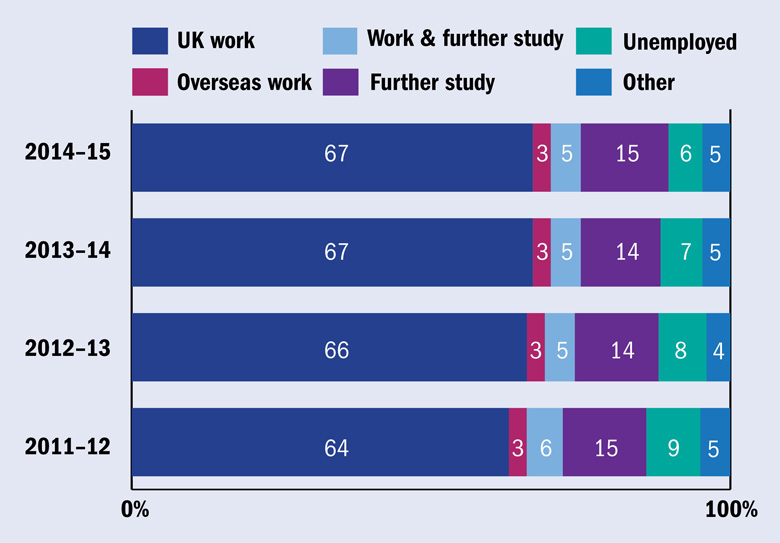The proportion of UK university leavers in work or further study has hit a record high, with more graduates going into professional jobs.
But the Destinations of Leavers from Higher Education survey, published on 30 June, also reveals a growing gender pay gap, with male graduates earning significantly more on average than their female counterparts.
Overall, the questionnaire of 399,345 UK and European Union students who completed their course in 2014-2015 says that 90 per cent of full-time first degree graduates were in work or further study six months later, the highest level since the survey began in its current form.
Seventy-five per cent were in work, the same as 2013-14, but the proportion who were in further study rose by 1 percentage point, to 15 per cent. There was a corresponding fall in the graduate unemployment rate, to 6 per cent, its lowest level under the current survey.
The DLHE says that 71 per cent of students who left university in 2014-15 were in roles classified as professional employment, up three percentage points year-on-year.
It reveals an increase in the mean graduate salary, from £21,500 to £22,500.
But women fared significantly worse than men when it came to earnings, with mean salaries of £21,000 and £24,000, respectively. The gender pay gap stood at £2,000 for 2013-14 graduates, so the latest figures suggest that it is growing.
Destinations of full-time first degree leavers by academic year

Source: HESA.
Note: Percentages in this chart have been rounded and may not add exactly to 100%
Steve West, vice-chancellor of the University of the West of England and chair of the University Alliance, said that it was “reassuring” to see that graduate employment was “trending in the right direction”, but expressed concern that the UK’s vote to leave the European Union could impact on the statistics in future.
“Following the result of the EU referendum it is even more important that we improve UK competitiveness and productivity,” Professor West said.
“My hope is that we can mitigate the unintended consequences of Brexit by building the right UK workforce that can tackle many of the high-skill requirements employers need.”
The survey, published by the Higher Education Statistics Agency, also shows varying employment outcomes for graduates of different disciplines.
The highest unemployment rate was among computer science graduates, one in 10 of whom were out of work. However, this has fallen steadily since 2011-12, when it was 14 per cent.
In contrast, fewer than 1 per cent of medicine and dentistry graduates were unemployed.
This is likely to be the penultimate publication of the DLHE in its current form since Hesa is consulting on plans for a reformed questionnaire that could draw employment information from national datasets rather than survey responses.
Register to continue
Why register?
- Registration is free and only takes a moment
- Once registered, you can read 3 articles a month
- Sign up for our newsletter
Subscribe
Or subscribe for unlimited access to:
- Unlimited access to news, views, insights & reviews
- Digital editions
- Digital access to THE’s university and college rankings analysis
Already registered or a current subscriber? Login








